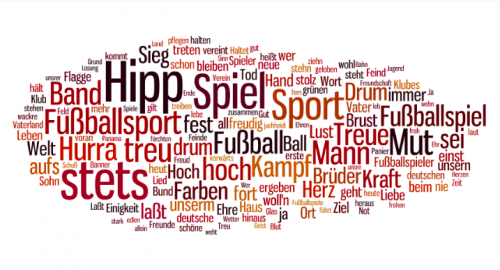What do football fan chants and pilgrimage songs have in common? They are sung to melodies that are already familiar, because that way only the new lyrics have to be learned and not the melody as well. This is true not only of today’s songs sung to the theme tune of the A-Team, Pippi Longstocking or „Seven Nation Army“ by the White Stripes, but also as far back as the turn of the 20th century, when „assocation football“ became known as „football without picking up the ball“. I found 90 German football fan songs in the volksliederarchiv.de, all from the three football song collections „Fussball Sang und Klang“, „Fussball-Liederbuch“ and „Sport-Liederbuch“, which were published in several editions until 1933. I had wordles created from the song texts.
Before I get to the Wordles, a few introductory words. (I won’t prevent you from scrolling down once, if you are too curious). I am aware that this is not an extremely representative evaluation.
- 90 songs are probably only a small of the songs circulating between 1895 and 1933
- I have only searched the folk song archive and only for the keyword „Fussball“
- I have not (yet) checked whether the text was reproduced correctly, who the authors were and what the intention behind it was
- The text is too unedited for Wordles, i.e. it was not adjusted by me according to a standard. This applies to lower and upper case as well as to abbreviations of words (for example our, unsre, uns’re). Different spellings can lead to a word cluster not appearing in the Wordle because it is too rarely in the same spelling.
- The songs available in the Volksliederarchiv are mostly from the Fussball-Liederbuch and rarely from the Sport-Liederbuch. I have not made an alignment of the proportions. (This is crucial for the Wordle with all the football-related lyrics of the three books.)
- The songs that can be found in the Volksliederarchiv are not, I think, all the songs that are in the three books. So I’ll have to buy copies first.
Briefly about the three sources, as song collections (also taken from the description text at Volksliederarchiv):
Fussball Sang und Klang. Liederbuch für den Arbeiter-Turn- und Sportbund: The first edition was published in 1920 by Arbeiter-Turnverlag A. G. Leipzig and contains 32 sport-related and 30 general folk and hiking songs. It includes the football songs of the workers‘ football clubs.
Deutsches Fussball-Liederbuch: The first edition was published in 1920 by Grethlein & Co. GmbH, Leipzig and Zurich. It appeared in at least six editions and contains 91 songs (a breakdown is not given). It contains the football songs of the non-working-class football clubs.
Sport-Liederbuch: The first edition appeared in 1921, self-published by the West German Spielverband, printed by the Wuppertaler Druckerei A.-H. in Elberfeld. J. Weirich compiled the songs. With about 250 pages, it is more extensive than the two song collections mentioned above and is divided into 1) Home, Fatherland and Festival Songs, Game and Sports Songs, Gymnastics, Hiking and Farewell Songs, Drinking Songs, 5) Humorous Songs, 6) Folk and Love Songs, 7) Songs in Appreciation of Women, 8) Various Songs. It contains the football songs of the non-working-class football clubs.
Wordles of the football-related songs of the three books
Football was often equated with military sports, especially around 1900 and in the first decades of the 20th century. The wordle of the Sport-Liederbuch, on the other hand, is more reminiscent than hiking/nature songs of the youth movement.
This is not surprising, because football was primarily a youth movement in Germany at the beginning of the 20th century. However, not so much of the financially weak social sectors, who simply could not afford the clothes and especially the football, which was often still imported from England. The more frequently mentioned terms „Mut“ („courage“), „Brust“ („breast“) and „immer“ („always“) already show a shift towards a national orientation, but the football songs collected here seem to see football more as a game that encourages young people to spend leisure time in nature, outdoors. The wordle of the songs in the Deutsches Fussball-Liederbuch, on the other hand, illustrates the way most Germans understand football. „Kampf“/“fight“, „Kraft“/“power, force“, „Treue“/“loyality“ and „stets“/“always“, „Mut“/“courage“, „Mann“/“man“ are also terms that have not necessarily disappeared in today’s understanding of football, especially loyalty. This can be seen at the latest in the transfer intentions of many a player or football enthusiast who changes his favourite club.
Wordles of all songs from „Fussball Sang und Klang“ and „Deutsches Fußball-Liederbuch“
(The Sport-Liederbuch has been omitted here as only a small proportion of the songs are about football and as I only get a small part of the content listed in the folk song archive).
Fussball Sang und Klang
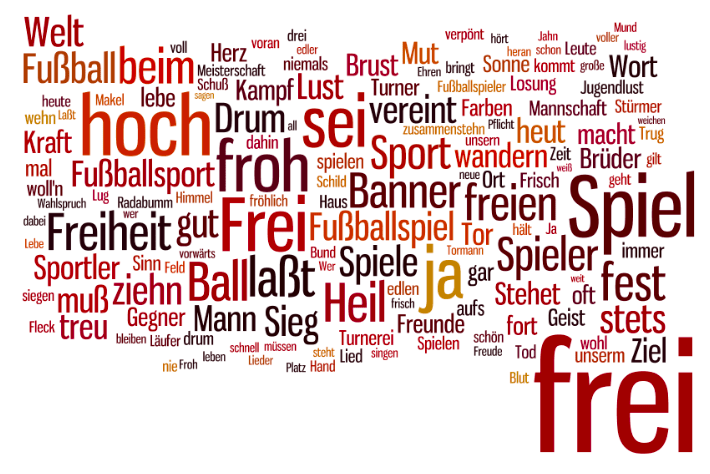
Wordle all the songs in „Fussball Sang und Klang“
Deutsches Fussball-Liederbuch
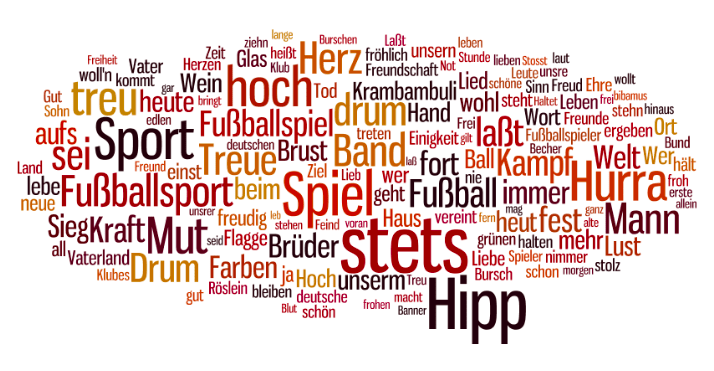
Wordle all the songs in the „Deutsches Fussball-Liederbuch“
If you also let the non-football related songs of these two songbooks create themselves, the impression is even stronger. In the wordle of Fussball Sang und Klang, the word „free“ in particular is found frequently („frei“/“free“, „(im) Freien“/“outdoor“, „Freiheit“/“freedom“), which is also due to the workers‘ gymnast greeting „Frei Heil!“, which is not infrequently found in their songs. In the songs collected in the Deutsches Fussball-Liederbuch, the concept of loyalty („treu“/“loyal“, „Treue“/“loyality“, „stets“/“always“, „Band“/“belt“) and the will to fight/win („Sieg“/“victory“, „Kraft“/“power, force“, „Mut“/“courage“, „Kampf“/“fight“, „Mann“/“man“) continue to play the greatest role.
Wordle of the two non-working-class football songbooks
(= Deutsches Fussball-Liederbuch & Sport-Liederbuch).
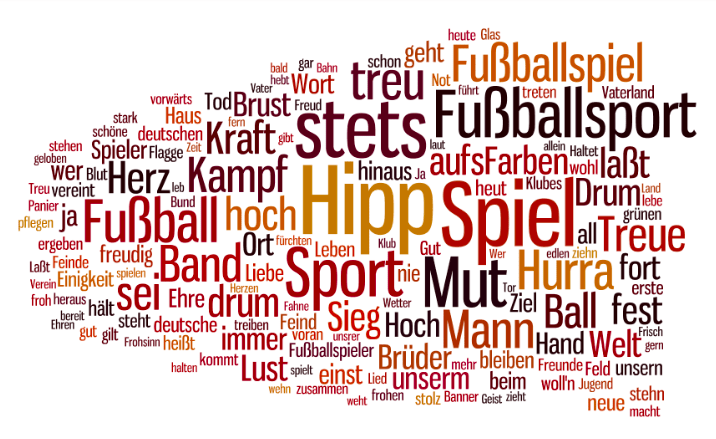
Wordle of the football-related songs from the „Deutsches Fussball-Liederbuch“ and „Sport-Liederbuch“
It shows little difference to the Wordle of football-related songs from the „Deutsches Fussball-Liederbuch“, as the songs from this collection comprise far more than half of the songs included in this Wordle.
Wordle of all football-related songs from all three football song collections
.
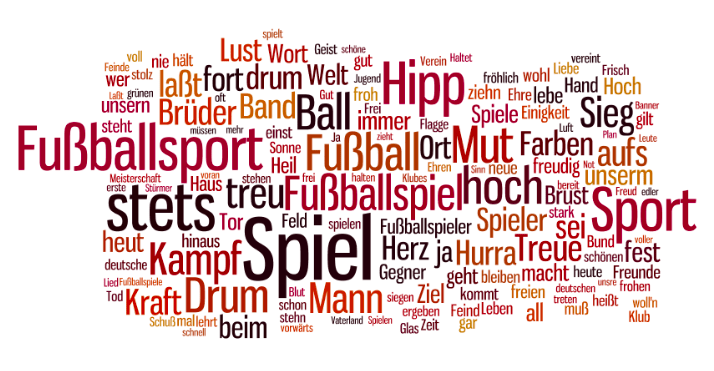
Wordle of the football-related songs in the „Deutsches Fussball-Liederbuch, „Fussball Sang und Klang“ and „Sport-Liederbuch“
And here, too, the high proportion of songs from the „Fussball Liederbuch“ is evident. „Free“/“Frei“ is only rarely found. But the sport of football, the ball, the game are all the more prominent here; clearly, they are the common ground of all three collections. „Mut“/“Courage“, „Drum“/“Therefore“, „Kampf“/“Fight“ and „Sieg“/“Victory“ are also found frequently in the „Fussball Sang und Klang“ song collection and are therefore conspicuously present in this Wordle. Here again for comparison…
Wordle of football-related songs from „Fussball Sang und Klang“
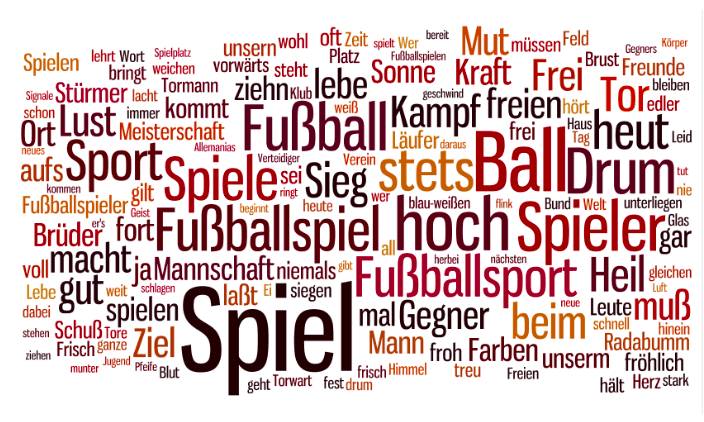
Wordle of the football-related songs in „Fussball Sang und Klang“
Wordle of the football-related songs from „Deutsches Fussball-Liederbuch“
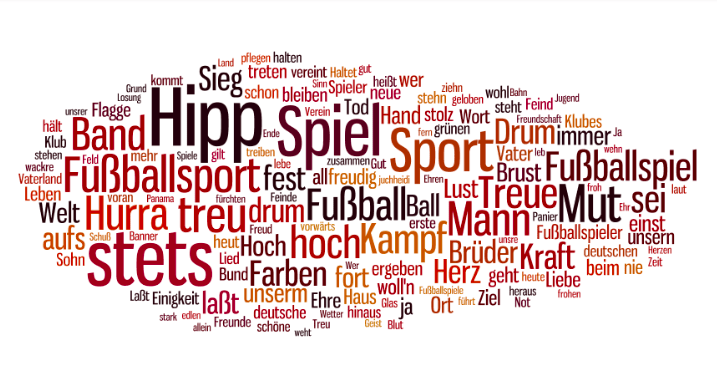
Wordle of football-related songs in „Deutsches Fussball-Liederbuch“
The melodies of the football-related songs from all three song collections
Most frequently, namely five times each, songs were sung to the melody of „Ich bin ein Preusse, ihr kennt meine Farben“ and „Stimmt an mit hellem hohen Klang“ – this accounts for a good 10% of all songs. The melody of almost as many is unknown. The melody of „representative“ songs (I can’t think of a better term right now) was chosen four times each, namely the Song of the Germans, the Kaisermarsch („Hipp, Hipp, Hurra“) and the Andreas Hofer song „Zu Mantua in Banden“). In addition, „Stroemt herbei, ihr Völkerscharen“ was also used for four songs, another 18 melodies were used for two songs, 31 melodies were re-textured only once (and found by me).

